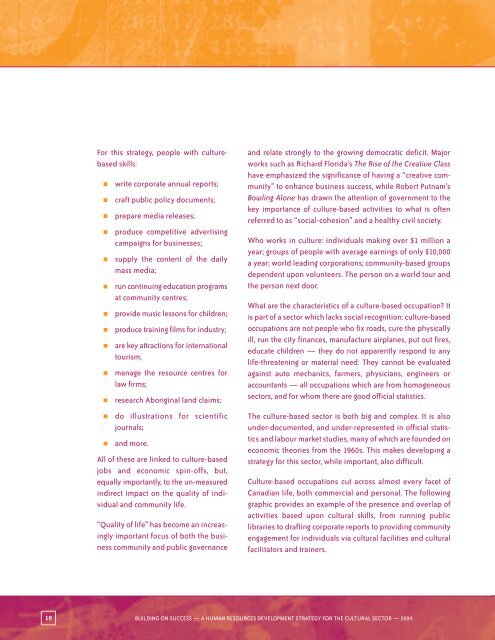Full document
Full document
Full document
Create successful ePaper yourself
Turn your PDF publications into a flip-book with our unique Google optimized e-Paper software.
For this strategy, people with culturebased<br />
skills:<br />
• write corporate annual reports;<br />
• craft public policy <strong>document</strong>s;<br />
• prepare media releases;<br />
• produce competitive advertising<br />
campaigns for businesses;<br />
• supply the content of the daily<br />
mass media;<br />
• run continuing education programs<br />
at community centres;<br />
• provide music lessons for children;<br />
• produce training films for industry;<br />
• are key attractions for international<br />
tourism;<br />
• manage the resource centres for<br />
law firms;<br />
• research Aboriginal land claims;<br />
• do illustrations for scientific<br />
journals;<br />
• and more.<br />
All of these are linked to culture-based<br />
jobs and economic spin-offs, but,<br />
equally importantly, to the un-measured<br />
indirect impact on the quality of individual<br />
and community life.<br />
“Quality of life” has become an increasingly<br />
important focus of both the business<br />
community and public governance<br />
and relate strongly to the growing democratic deficit. Major<br />
works such as Richard Florida’s The Rise of the Creative Class<br />
have emphasized the significance of having a “creative community”<br />
to enhance business success, while Robert Putnam’s<br />
Bowling Alone has drawn the attention of government to the<br />
key importance of culture-based activities to what is often<br />
referred to as “social-cohesion” and a healthy civil society.<br />
Who works in culture: individuals making over $1 million a<br />
year; groups of people with average earnings of only $10,000<br />
a year; world leading corporations; community-based groups<br />
dependent upon volunteers. The person on a world tour and<br />
the person next door.<br />
What are the characteristics of a culture-based occupation? It<br />
is part of a sector which lacks social recognition: culture-based<br />
occupations are not people who fix roads, cure the physically<br />
ill, run the city finances, manufacture airplanes, put out fires,<br />
educate children — they do not apparently respond to any<br />
life-threatening or material need. They cannot be evaluated<br />
against auto mechanics, farmers, physicians, engineers or<br />
accountants — all occupations which are from homogeneous<br />
sectors, and for whom there are good official statistics.<br />
The culture-based sector is both big and complex. It is also<br />
under-<strong>document</strong>ed, and under-represented in official statistics<br />
and labour market studies, many of which are founded on<br />
economic theories from the 1960s. This makes developing a<br />
strategy for this sector, while important, also difficult.<br />
Culture-based occupations cut across almost every facet of<br />
Canadian life, both commercial and personal. The following<br />
graphic provides an example of the presence and overlap of<br />
activities based upon cultural skills, from running public<br />
libraries to drafting corporate reports to providing community<br />
engagement for individuals via cultural facilities and cultural<br />
facilitators and trainers.<br />
10<br />
BUILDING ON SUCCESS — A HUMAN RESOURCES DEVELOPMENT STRATEGY FOR THE CULTURAL SECTOR — 2004










